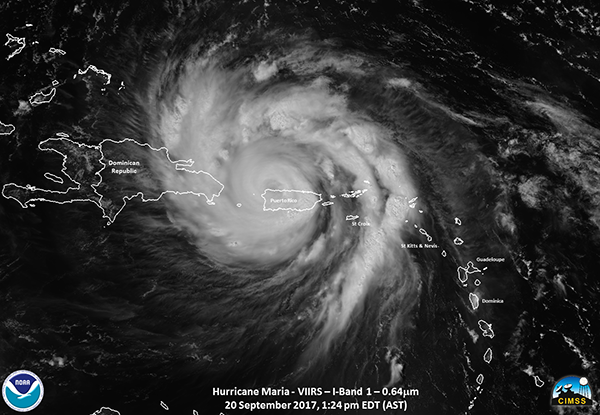
| NYWI HOME PAGE | VISITING WRITERS & EVENTS INDEX |
The Lessons of Hurricane Maria: |
 |
| Puerto Rico is seen in the center of Hurrican Maria from this satellite image taken Sept. 20, 2017 (NOAA) |
Monday. January 28, 2019
7:30 p.m., Page Hall, 135 Western Avenue, University at Albany Downtown Campus.
Free and open to the public.
Hurricane Maria made landfall on Puerto Rico on September 20, 2017, as a high-end Category 4 hurricane with winds of 155 mph.
According to the National Center for Atmospheric Research, Hurricane Maria hit Puerto Rico with the destructive force of a "50- to 60-mile-wide tornado.” Destroying the island’s power grid, and decimating the territory’s agricultural industries, the storm left a shattered infrastructure, a crippled economy, and numerous public health emergencies.
A distinguished panel from diverse fields will address questions regarding the ongoing humanitarian crisis and its lessons for the future.
The panel will include:
Michelle Centeno, president of the National Conference of Puerto Rican Women (NACOPRW), a non-profit, non-partisan organization to promote the full participation of Puerto Rican and other Hispanic women in their economic, social and political life in the United States and Puerto Rico. She is also Senior Labor Policy Advisor for the NYC Department of Citywide Administrative Services (DCAS).
Robert Griffin, is the founding dean of the College of Emergency Preparedness, Homeland Security and Cybersecurity (CEHC) at the University at Albany, the first college of its kind in the nation. He has a long career in homeland security at the Federal and local levels of government. He served as the acting undersecretary for Science and Technology at the U.S. Department of Homeland Security, the deputy undersecretary for Science and Technology, and director of the Science and Technology Directorate’s First Responders Group.
David Holtgrave, is dean of the School of Public Health at the University at Albany, and a SUNY Empire Innovation professor. Prior to coming to UAlbany he was chair of the Department of Health, Behavior and Society at the Johns Hopkins Bloomberg School of Public Health. He has worked extensively in the field of HIV prevention.
Shao Lin, is professor of Environmental Health Science, Epidemiology and Biostatistics at the University at Albany’s School of Public Health, where she specializes in the impacts of climate change, extreme weather, and natural disasters on human health. She is also associate director of Global Health Research at the School of Public Health.
Irwin Redlener, is professor of Health Policy and Management of Pediatrics at Columbia Mailman School of Public Health. He established the National Center for Disaster Preparedness at Mailman School of Public Health, and created public health initiatives in the U.S. Gulf region ravaged by Hurricane Katrina. A leading expert on disaster preparedness, he is the author of the book Americans at Risk: Why We Are Not Prepared for Megadisasters and What We Can Do Now (2006).
Havidán Rodríguez, is president of the University at Albany. He was the founding provost and executive vice president for academic affairs at The University of Texas Rio Grande Valley. Prior to his leadership positions in Texas he held administration positions at the University of Delaware, where he directed its acclaimed Disaster Research Center, the world’s first research center devoted to studying the complex social problems that result from natural and technological disasters and other community-scale crises. He has also studied the socioeconomic impacts of disasters and economic well-being of minority populations in the United States and Puerto Rico.
Donations to benefit Hurricane Maria relief efforts may be made to:
The Asociación Mayaguezana de Personas con Impedimentos (The Mayaguezana Association of People with Disabilities) AMPI, Inc. at https://www.ampipuertorico.org/donar-donate/
Relief4PR http://www.relief4pr.org/
Cosponsored by the Journalism Program of the University at Albany Department of Communication.